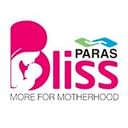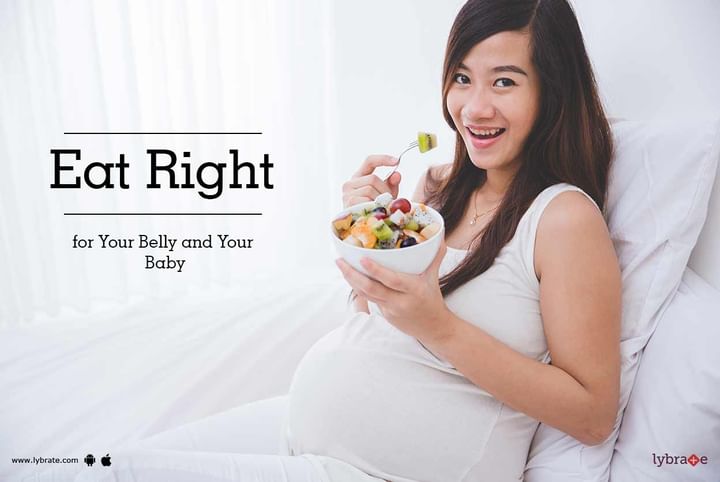Eat Right for Your Belly and Your Baby
Pregnancy is a life-changing experience, and you've got to be armed with the right nutrition to take it on!
For many moms-to-be, pregnancy is the time to rest, relaxation, and pampering and while for some, it may be stressful, especially if the pregnancy involves medical complications. Either way, it is a turning point in your life, physically, mentally, and emotionally. And food is an important part of this journey which requires a lot many changes in the diet, which has to be rightly balanced so that you are eating right for your belly and your baby.
A nutritious, balanced diet through pregnancy is important not only to maintain maternal nutritional needs, but also for the development of a healthy fetus. Remember, nutrition at this time needs to cater to the continuous adjustments in maternal body composition and metabolism.
The number of calories you will need to consume in addition to your regular diet is just 150 Kcal in the first trimester and 350 Kcal in the second and third. These surely need to be healthy calories, not empty calories. A clinical dietician will help you navigate the distribution of calories, but do keep them in check, as your maternal obesity puts you at risk for other serious medical conditions such as gestational diabetes. It may also put your baby at risk for future obesity and
other diseases.
Similarly, if you have morning sickness, you may not feel the urge to eat, and you may be underweight. In this case make each calorie count check, with nutritionally rich foods. Ensure that total weight gained throughout your pregnancy is between 12 and 14 kg. Cut down on refined sugar, and while ghee and butter are okay if you are not already overweight, avoid binging on them.
When it comes to pregnancy diet, there are certain foods that need to be definitely avoided. Foods that are too high in mercury or Vitamin A can pose a health risk to your baby, as can foods that are known to cause food borne illness such as Listeriosis and Salmonella poisoning. List of foods that are right for you and your baby.
For Boosting Your Baby Brain And Your Own Health:
Eat: fish, vegetable oils, nuts (especially walnuts), flax seeds, flax seed oil, dark leafy vegetables
Why: These are rich sources of Omega-3 fatty acids, an important component in boosting the development of the brain formation in the fetus, especially in the second half of pregnancy. According to the Harvard School of Public Health, US, Omega-3 is an integral part of the cell membranes and forms the building blocks of the fetal brain. While fish does contain mercury, US guidelines stipulate that two servings of fish in a week is safe. If you are not able to eat fish, ask your doctor if you should have a fish oil supplement. The two most beneficial forms of Omega-3s come from aquatic sources. But if you are vegetarian, you could try the other sources as well. This essential fatty acid is also known to reduce cholesterol, hence blood pressure.
For The Building And Strengthening Of Bones, For The Baby And You:
Eat: milk and dairy products, ragi (finger millet), broccoli, spinach
Why: To fulfill its own bone development requirement, the fetus will derive its calcium from the mother, whether or not the mother is getting adequate calcium herself. The National Institute of Nutrition has set the calcium needs for pregnant women and nursing mothers as double compared to non-pregnant women. You will need 1,200 mg per day. Two glasses of milk will give you approximately half the requirement. You can derive the rest from the other sources. Also make sure you get some sun, preferably in the morning, when it is not too warm, to help create vitamin D, necessary for good bone health.
Up Your Immunity:
Eat: colourful fruits and vegetables; probiotic foods such as yogurt
Why: Pregnancy is a time when you want to be safe and not catch any infections, especially those that can harm the fetus. Fruits and vegetables are antioxidant-rich. They have phytochemicals that naturally occur in plants, protecting them against infections. They'll help you do the same. Each colour gives a different benefit, so eat the rainbow through the week. Probiotic foods help maintain gut health. Set your own yogurt, as this contains many more 'good, healthful' bacteria than store-bought varieties.
For The Prevention Of Birth Defects In Baby:
Eat: legumes, green leafy vegetables, citrus fruits, nuts, beans
Why: Legumes include lentils, peas, beans, chickpeas, soybeans, and peanuts. The group is a rich source of folic acid, which helps in prevention of neural tube defects (birth defects of the brain, spine or spinal cord). Folate is one of the B-vitamins (B9), especially important in the first trimester. Your doctor will provide you with supplements, but you can also make sure you get the vitamin in your diet. Folic acid works closely with vitamin B12, to make red blood cells and make iron work properly in the body. If possible, eat organic, so you're not taking in too many chemicals.
For Overall Growth And Development:
Eat: small amounts of red meat, chicken, spinach
Why: Iron is an essential nutrient, and is needed for fetal and placenta growth, as well as for the development of the mother's own tissue. About 50-70% of Indians are anemic, and this is a cause of serious concern. Your doctor will prescribe additional iron in the form of a supplement; however, you can also get it in the diet.
Foods to be avoided when you're pregnant:
- Avoid unpasteurized milk.
- Avoid Alcohol.
- Avoid raw or undercooked meat, fish and eggs.
- Avoid unwashed vegetables and fruits.
- Avoid raw sprouts (Eating raw sprouts increases your risk of salmonella poisoning, which causes fever, vomiting and diarrhea. Be sure to cook sprouts thoroughly.)
- oid excess of caffeine.



+1.svg)
